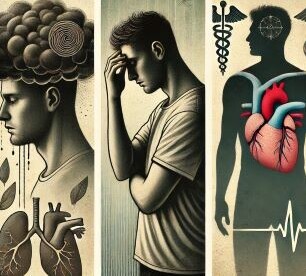
Erectile dysfunction, often misunderstood as solely a physical issue, has deep roots in the mind as well as the body. It’s like having a two-way street where physical health and mental state play bumper cars. Stress, anxiety, and depression aren’t just emotional experiences. They can actually put the brakes on your sexual relations, leading to ED. Understanding this link can be a game-changer when managing the condition.
Let’s kick it off with stress and anxiety. These aren’t just feelings—they’re like that annoying app running in the background draining your phone’s battery. When stress levels skyrocket, so does the production of cortisol, the stress hormone. This then messes with blood flow and lowers sexual response, sometimes landing a guy in ED territory. Simply put, an anxious mind can make it tough to get things going in the bedroom.
Depression adds its own twist to the story. Beyond just feeling the blues, it can zap your energy and shut down interest in activities once enjoyed, including intimacy. Studies have shown a clear connection between depression and ED, creating a cycle where one feeds into the other, making things worse on both ends. It’s a frustrating loop, but recognizing this link is a step towards breaking it.
Science backs up the whole gut feeling that emotional well-being is intertwined with sexual health. Research highlights that men with untreated mental health issues are far more likely to struggle with ED. It’s not just about knowing this but using this knowledge to manage both mental and physical health proactively. Addressing mental health needs to take priority, not only to improve mood but also to boost sexual functionality.
Recognizing this connection empowers you to treat ED with a lens that sees beyond just the physical. It’s not just popping a pill but addressing the mind, which is often the unsung hero. Fishing for ways to improve mental health? Think of relaxation techniques, therapy, and open conversations. Just as you’d tune up a car, tending to mental well-being might unlock the power under the hood.
Emotional Impact of Erectile Dysfunction on Men
Erectile dysfunction doesn’t just ruffle the sheets; it dives deep into a man’s psyche, shaking the very foundation of self-esteem and confidence. Suddenly, something that’s often taken for granted starts to feel like a Herculean task. The emotional rollercoaster it triggers can be as intense as the physical symptoms themselves.
Confidence takes a hit here. Imagine going through life with that gnawing feeling of inadequacy constantly hovering. For many, ED casts a lingering shadow over social and personal relationships, causing guys to withdraw from partners and avoid intimacy to escape embarrassment. It’s rough, especially when trust starts dwindling on both ends.
Relationships can feel unsteady, like walking on a tightrope. The pressure it places on personal connections isn’t something to shrug off. What doesn’t often get discussed enough is how it might lead to arguments and misunderstandings, with both parties feeling a mix of confusion and frustration.
The stigma—oh boy—doesn’t help at all. Society has a way of labeling things, and ED often gets thrown into the “taboo” category. This stigma pushes many to suffer in silence, causing even more emotional distress. When it becomes internalized, low self-worth and feelings of failure start to mount up, making it hard to talk about the problem.
Yet, opening up can really ease this burden. Consider initiating a conversation with your partner, creating a safe space to share fears and insecurities without judgment. Seeking support groups can also be a game-changer. Remember, you’re not alone in this journey, and connecting with others facing similar challenges can provide new insights and much-needed support.
Remember, it’s okay not to be okay, but it’s also important to take steps towards addressing these emotional impacts head-on. Hold on to this: finding the courage to talk about ED doesn’t just relieve personal stress—it can strengthen bonds and foster understanding in relationships as well.
Distinguishing Psychological Erectile Dysfunction from Physical Causes
Figuring out whether erectile dysfunction is all in the mind or a physical glitch can be like piecing together a mystery. Psychological ED can sneak up when everything’s fine physically, yet nothing seems to spark the right way mentally. If a guy finds that he can get an erection just fine when waking up, but not when getting busy with a partner, it might point to psychological causes.
Understanding this can be a bit like playing detective. Notice if the problem occurs only sometimes or in specific situations, like during stress-inducing encounters. Do erections occur when no pressure’s applied, say during self-stimulation or while watching erotic content? It might suggest a mental block rather than a biological issue.
Partnering up with a healthcare professional can unveil more about this mind-over-body situation. They typically assess if stress, anxiety, or even unconscious beliefs about sex are in play. These evaluations are goldmines, offering insights that might go unnoticed.
On the flip side, dismissing signs of physiological issues outright isn’t wise. Remember, sometimes it’s a mix of both, and distinguishing them isn’t always straightforward. Misconceptions abound, and separating fact from fiction is crucial in understanding the origins and treatment for ED.
Diagnosing psychological ED doesn’t dismiss the physical; rather, it opens up the possibilities for holistic treatment that addresses both areas. A mental health assessment shines light on the unseen aspects, putting control back in the driver’s seat. It’s about creating a blueprint tailored just for you that encompasses all potential causes.
Strategies for Mental Coping with Erectile Dysfunction
Feeling like you’re up against a wall with ED? Fear not, there are ways to tackle this beyond just medical interventions. Your mental approach can be a significant part of the solution. Embracing mindfulness and cognitive behavioral therapy (CBT) can bring some peace to your mental hustle. These techniques help change negative thought patterns, turning worry into a more productive mindset.
Communication is your ally here. Having heartfelt conversations with your partner isn’t all about baring your soul—it’s about easing those nerves and building a bridge of empathy and understanding. This open dialogue can alleviate pressures on both sides, making intimacy a shared journey rather than a solo mission.
Thinking about lifestyle tweaks? Yeah, they make a difference too. Exercise, for instance, boosts mood and improves circulation, which doesn’t hurt in the bedroom. Cutting back on booze and quitting smoking are lifestyle changes that can significantly enhance both physical and mental health.
And don’t overlook the power of reaching out to support networks. Whether it’s online communities or local groups, sharing stories and tips with others sailing the same waters can prove invaluable. They offer a space to be heard, supported, and encouraged.
While it might feel overwhelming initially, remember these coping strategies are about taking small, manageable steps that collectively make a big difference. It’s about being proactive in the face of ED, shaping an approach that empowers rather than confines you.
Seeking Professional Help: A Path Towards Recovery

When dealing with ED, it’s important to know when to call in the experts. If the problem persists despite trying self-help tactics, consulting a healthcare professional can’t be overstated. They offer a wealth of knowledge, paving a path from frustration to answers.
Treatment options today are more nuanced, tackling both the physical and psychological aspects of ED. Whether it’s through medication, therapy, or a blend of approaches, professionals tailor solutions to fit your unique story. Understanding that seeking help is not admitting defeat but a proactive step towards recovery can be liberating.
Meeting with a therapist might demystify the unseen psychological blocks. Cognitive and interpersonal therapies are effective tools in breaking down these barriers. The result? You’re not just following a generic recipe but crafting a treatment plan that resonates with personal experiences and goals.
Stories of triumph and testimonials abound and serve as a reminder that improvements are not just a possibility—they’re real and achievable. These narratives reinforce the notion that plenty of men have bounced back, showcasing that resilience coupled with the right help does wonders.
Creating an environment that supports and understands is crucial along this journey. Surrounding yourself with empathetic individuals who bolster rather than belittle the recovery process can make all the difference. Support encourages, and with it, the healing journey feels less lonely and more hopeful.
